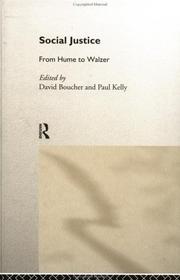| Listing 1 - 7 of 7 |
Sort by
|
Book
ISBN: 0080339476 Year: 1987 Publisher: Oxford
Abstract | Keywords | Export | Availability | Bookmark
 Loading...
Loading...Choose an application
- Reference Manager
- EndNote
- RefWorks (Direct export to RefWorks)
Book
Year: 2022 Publisher: London : LSE Press,
Abstract | Keywords | Export | Availability | Bookmark
 Loading...
Loading...Choose an application
- Reference Manager
- EndNote
- RefWorks (Direct export to RefWorks)
Violence and war were ubiquitous features of politics long before the emergence of the modern state system. Since the late 18th century major revolutions across the world have further challenged the idea of the state as a final arbiter of international order. This book discusses ten major thinkers who have questioned and re-shaped how we think about politics, violence and relations between states - Thucydides, Augustine, Machiavelli, Hobbes, Locke, Rousseau, Clausewitz, Lenin and Mao, and Schmitt. Conflict, war and revolution have generally been seen in political thought as problems to be managed by stable domestic political communities. In different ways, all the paradigmatic thinkers here acknowledge them instead as inevitable dimensions of human experience, manifested through different ways of acting politically - while yet offering radically distinct answers about how they can be handled. This book dramatically broadens the canon of political thought by considering perspectives on the international system that challenge its historical inevitability and triumph. Drawing on history, theology, and law as well as philosophy, Paul Kelly introduces thinkers who challenge fundamentally the ways in which we should think about the nature and scope of political institutions and agents. He illuminates many troubling contemporary conflicts with a critical and historical perspective. This book is primarily intended for second year and upwards undergraduate students in general political theory and international theory, and advanced international relations students. Each chapter is also downloadable on its own for use in courses considering only some of the ten theorists covered. Written in an accessible way Conflict, War and Revolution will also interest advanced general readers with interests in the historical thought underpinnings of political ideas and today's international politics.
Political science --- International relations. --- Philosophy.
Book
Year: 2022 Publisher: London : LSE Press,
Abstract | Keywords | Export | Availability | Bookmark
 Loading...
Loading...Choose an application
- Reference Manager
- EndNote
- RefWorks (Direct export to RefWorks)
Violence and war were ubiquitous features of politics long before the emergence of the modern state system. Since the late 18th century major revolutions across the world have further challenged the idea of the state as a final arbiter of international order. This book discusses ten major thinkers who have questioned and re-shaped how we think about politics, violence and relations between states - Thucydides, Augustine, Machiavelli, Hobbes, Locke, Rousseau, Clausewitz, Lenin and Mao, and Schmitt. Conflict, war and revolution have generally been seen in political thought as problems to be managed by stable domestic political communities. In different ways, all the paradigmatic thinkers here acknowledge them instead as inevitable dimensions of human experience, manifested through different ways of acting politically - while yet offering radically distinct answers about how they can be handled. This book dramatically broadens the canon of political thought by considering perspectives on the international system that challenge its historical inevitability and triumph. Drawing on history, theology, and law as well as philosophy, Paul Kelly introduces thinkers who challenge fundamentally the ways in which we should think about the nature and scope of political institutions and agents. He illuminates many troubling contemporary conflicts with a critical and historical perspective. This book is primarily intended for second year and upwards undergraduate students in general political theory and international theory, and advanced international relations students. Each chapter is also downloadable on its own for use in courses considering only some of the ten theorists covered. Written in an accessible way Conflict, War and Revolution will also interest advanced general readers with interests in the historical thought underpinnings of political ideas and today's international politics.
Political science --- International relations. --- Philosophy.
Book
ISBN: 9781909890749 9781909890756 9781909890732 Year: 2022 Publisher: London : LSE Press,
Abstract | Keywords | Export | Availability | Bookmark
 Loading...
Loading...Choose an application
- Reference Manager
- EndNote
- RefWorks (Direct export to RefWorks)
"Violence and war were ubiquitous features of politics long before the emergence of the modern state system. Since the late 18th century major revolutions across the world have further challenged the idea of the state as a final arbiter of international order. This book discusses ten major thinkers who have questioned and re-shaped how we think about politics, violence and relations between states – Thucydides, Augustine, Machiavelli, Hobbes, Locke, Rousseau, Clausewitz, Lenin and Mao, and Schmitt."

ISBN: 1134749538 1280140755 0203978471 9780203978474 9780415149976 0415149975 9780415149983 0415149983 0415149975 0415149983 9781134749539 9781280140754 9781134749485 9781134749522 113474952X Year: 1998 Publisher: London New York Routledge
Abstract | Keywords | Export | Availability | Bookmark
 Loading...
Loading...Choose an application
- Reference Manager
- EndNote
- RefWorks (Direct export to RefWorks)
A significant addition to debates on social justice, this study explores key issues such as democracy, freedom, special rights and John Stuart Mill's liberal Utilitarianism, bringing these concerns to the fore of the political agenda.
Social justice. --- Equality. --- Egalitarianism --- Inequality --- Social equality --- Social inequality --- Political science --- Sociology --- Democracy --- Liberty --- Equality --- Justice
Book
Abstract | Keywords | Export | Availability | Bookmark
 Loading...
Loading...Choose an application
- Reference Manager
- EndNote
- RefWorks (Direct export to RefWorks)
Science --- Technical education --- Study and teaching --- Congresses --- Social aspects
Book
ISBN: 0080339468 Year: 1987 Publisher: Oxford Pergamon
Abstract | Keywords | Export | Availability | Bookmark
 Loading...
Loading...Choose an application
- Reference Manager
- EndNote
- RefWorks (Direct export to RefWorks)
Health education --- Health --- Health Education --- Case studies --- Congresses --- methods
| Listing 1 - 7 of 7 |
Sort by
|

 Search
Search Feedback
Feedback About UniCat
About UniCat  Help
Help News
News